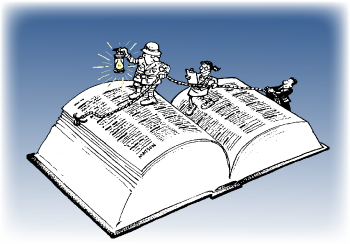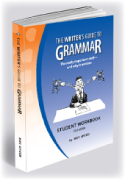|
newsletter — June 2, 2014: more on "Digging In"
Does your student annotate?
Annotating the Text, Part 1: Is it really so important?
by Roy Speed
 Note: In our series on "Digging In," we're taking a close look at study skills. High school work should build foundational skills students will use for the rest of their lives, both in college and later — skills like taking notes, annotating texts, being organized, scheduling tasks, prioritizing, and so on. Note: In our series on "Digging In," we're taking a close look at study skills. High school work should build foundational skills students will use for the rest of their lives, both in college and later — skills like taking notes, annotating texts, being organized, scheduling tasks, prioritizing, and so on.
In our first piece, we zeroed in on one of those skills: close reading. — This piece follows up by discussing a closely related practice: annotating the text.
Read Part 2 of this article here.
There's no way around it: As your kids approach high school, they must begin marking up their books.
The fact is, throughout high school and college, a well-read book is a book whose pages have downturned corners and are filled with notes, underlining, stars, and arrows. Even the endpapers — those blank pages at the front and back of a book — may be covered in scribbled notes.
Put another way, the book is no longer just the work of the author; it contains the work of the student. The student's personal copy becomes:
- a record of his or her own close reading — of the student's own struggles with (and digestion of) the book's contents;
- a study aid — at exam time or when preparing to write a paper, the student can browse his or her own scribblings and in minutes recapture the principal information, concepts, and reflections that represent the most important points — both the author's and the student's — contained in that book.
Resistance to annotation
I've been teaching close reading for some years now, and more than once I've encountered surprising resistance among a minority of parents who are absolutely opposed to their kids writing in their books. By way of explanation, these parents have told me all of the following:
- We never buy books if we can just borrow them from the library… (so we don't write in them).
- If we write in the book, we'll lose money when it comes time to sell it… (so we don't write in them).
- I teach my children to respect books… (so we don't write in them).
Students, too, may be reluctant to write in books: I occasionally encounter a student who will describe herself as "a neat freak," or as someone who appreciates — as do I — "the pristine appearance" of an unmarked book. My own position: I would make a special claim for the nature of study in the high school and college years, when students are making a necessary transition from reading books to studying books. By "studying," I mean the student must now:
- read and re-read;
- articulate personal understanding, insights, positions, and arguments;
- extract from books and retain unprecedented quantities of information — and be able to produce that information on demand, e.g., in an exam, in a profession, in life.
Clever students often underestimate the challenge of getting knowledge out of a book and into their heads: they think simply reading a book is sufficient study — Check it off the list; move on. The reality, however, is that more than ninety-nine percent of students retain only a tiny fraction of what they read; they need all the help they can get.
A study skill & a valuable practice
Annotating the text is both a practice that deepens study — deepens the student's engagement with a text and its author — and a skill that, once learned, can save students precious time later on, when they must return to the text and mine it for information or evidence.
Exactly how a student annotates will vary with the nature of the text — whether it's a novel, a poem, a work of history or economics, a science text. But the exact method of annotation is less important than what the annotations represent: the student's interaction with the text and its author.
The philosopher and educator Mortimer Adler was a big believer in the practice of scribbling in books. He once wrote that you don't truly "own" a book until you've digested its contents —
…made it a part of yourself, and the best way to make yourself a part of it is by writing in it. You may buy a beefsteak and put it in your freezer, but you do not own it in any important sense until you consume it and get it into your bloodstream. Books, too, must be absorbed into your bloodstream [emphasis mine].
Adler was also well aware that annotation was indispensable to close reading. When he defends writing in books, the essence of his argument is that it aids close reading:
Here's why you should mark your books:
1) It keeps you awake — and I don't mean merely conscious; I mean awake.
2) Reading, if it is active, is thinking — and thinking tends to express itself in words, spoken or written. The marked book is the thought-through book.
3) Writing helps you remember — remember the thoughts you had, or the thoughts the author expressed.
Annotations as "breadcrumb trail"
Here's another way of thinking about the practice of scribbling in books:
With each book they digest, effective students leave themselves a breadcrumb trail through the entire text, marking all the steps along their path to understanding. Good annotations are ones that enable students to quickly retrace their steps, quickly locate an important concept or bit of evidence; they're trails that are easy to follow.
Recommended reading for your student. In 1940 Mortimer Adler wrote
the book How to Read a Book and included a chapter called "How to Mark a Book."
See here for our adapted and streamlined version of this useful chapter. |
In our next newsletter: Levels of annotation
What your student does with a text mirrors exactly the nature of his or her engagement with the work and its author. Learn how, with just a glance at your student's text, you can discern both:
- her current level of engagement;
- where she must go next.
* * *
Not on our mailing list? — Adding yourself is easy; just go here.
|
|
|
View all our online courses here.
Eight weeks, in depth, live & online
Twice weekly sessions for two semesters
Twice weekly sessions for two semesters
- March 7, 2020: Beyond the Tour: Getting the most from your college visits
- July 29, 2019: Advocating for oneself, Part 2: College admissions essays & interviews
- May 29, 2019: What our students aren't taught about grammar
- May 16, 2017: Advocating for oneself (Part 1 of 2)
- July 20, 2016: The development of adolescent minds
- December 24, 2015: The appeal of videogames—and the hazards they bring
- August 16, 2015: Three skills your student needs to develop before college (Part 1 of 3)
- July 3, 2015: How literature is now taught in college—and why enrollment in literature courses is in steep decline
- June 1, 2015: Teaching Shakespeare to your kids: What I've learned
- Dec 28, 2014: Extracurricular activities, Part 2
- July 27, 2014: Levels of annotation —
Annotating the text, Part 2
- July 15, 2014: Extracurricular activities, Part 1
- July 2, 2014: Teens need to be together… An innovative solution
- June 9, 2014: The college admissions racket — Getting things into perspective
- June 2, 2014: Building good study habits
— Annotating the text, Part 1
- April 8, 2014: Building good study habits
— Close reading
- March 18, 2014: Why all our students must study Shakespeare
- Feb 25, 2014: Standardized tests, Part 2
- Feb 18, 2014: Standardized tests, Part 1
- Feb 1, 2014: Advanced mathematics
|
|
Shakespeare Intensives
Close reading of Shakespeare
Ten online sessions of 90 minutes
Ten online sessions of 90 minutes
Seven online sessions of 90 minutes
An introduction to Shakespeare's comedy
Eight online sessions of 90 minutes
ONLINE: English Language Arts
— Now open for registration —
Weekly online class
in the essentials of English
 This two-semester course is taught by the author of The Writer's Guide to Grammar. It puts in place skills and knowledge foundational to the study of English and the mastery of clear writing. The weekly class is live and online, and students master all the most important principles of the English language — grammar, usage, punctuation, and more. This two-semester course is taught by the author of The Writer's Guide to Grammar. It puts in place skills and knowledge foundational to the study of English and the mastery of clear writing. The weekly class is live and online, and students master all the most important principles of the English language — grammar, usage, punctuation, and more.
Online Writing
Two semesters of online classes
Two classes per week
Online Literature
Two semesters of online instruction
Training for parents
Now an online series!
This program addresses the principal concerns parents have about homeschooling through high school — curriculum and credits, standardized tests, transcripts and record-keeping, the application process, pursuing scholarships, and more.
Terrific. Full of information. The materials were so thorough. I now have a plan of action. Also, this workshop is inclusive: No matter what type of homeschooler you are, you will understand better how to prepare your student for college and present him or her in the best light.
Mother of two
|
|
![]()